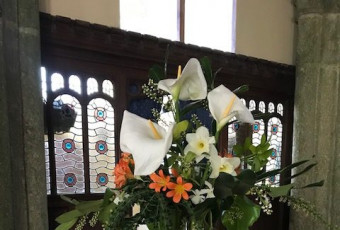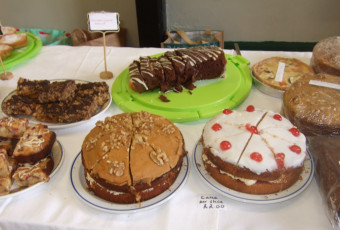I have been asked to put my sermon on line about my trip to Tanzania. Here it is:
Lammas 2015 – 9 August 2015
For the last 10 days I have been in Tanzania working with our Executive Head Teacher Gavin Hamilton and a teaching assistant Julia Boston. We have visited many schools and worked in the two schools twinned with Meavy and Lady Modiford’s Walkhampton: Kisimatui and Yusuf Makamba. There are 120 children in some classes and teaching is rather Victorian in delivery but the children are glad to be learning. The schools have no electricity and a clean water supply was added to one of the schools last year. The tap is kept locked, not to protect the supply, but to stop anyone stealing the tap.
One day we were detailed to go to Kisimatui, the most rural of the schools we are twinned with, where we had the job of painting number lines on the bare walls of the classrooms. We were promised lunch. We took our own bottled water and when lunchtime came we were ushered into the staffroom to join the other staff. Lunch was put in front of us. It consisted of a few chapattis and a small loaf of bread. We broke the chapattis in half to make enough to go around and took a slice of bread. That was lunch. There was nothing to go on the bread. No butter – nothing. A few minutes later some children brought in 3 green oranges, which we shared around.
That was a humbling experience. I am sure that the school had given of its best. They had given us all that they had.
On another occasion we were welcomed to the school and ushered to sit under some trees for shade and were surrounded by hundreds of children. We were given fresh coconuts to drink from and then offered some food. We ate in front of the children. I asked when the children had lunch? The answer was that they didn’t get any because school finished at 2pm and they were expected to go home for food. I felt rather uncomfortable eating with so many eyes looking on at me.
In Kisimatui school there were at least 600 children. I forget the exact number, but it is huge. Of these, 56 are orphans. In Tanzania an orphan is defined as a child who has lost one or more parent who are no longer able to care for their children. Many had died of malaria and of course HIV. In a rather uncomfortable experience all the orphans were gathered together in one room and introduced to us as the orphans. Back in class, one of the orphans asked a question, “How are orphans treated in the UK?” It was clear that this child wanted to know if the lot of orphans was any better than his experience of life. That was difficult.
So when I read that Jesus is the bread of life and how he told the Jews that anyone who eats of this bread shall have eternal life, I am grateful for the reminder that the bread of life is available to all who wish to partake of it and come to Christ.
I am also reminded that in order to come to Christ people have to have the physical strength provided by earthly food. Yes we will have to eat again and again to sustain ourselves but our physical well-being is necessary to assist our spiritual well-being. Offering spiritual consolation while people go hungry seems to me to be hollow religion at its worst. It was condemned by Jesus in the famous exchange in Matthew’s Gospel (chapter 25) “For when I was hungry you gave me food; when thirsty, you gave me drink; when I was a stranger, you took me into your home; when naked, you clothed me; when I was ill, you came to my help; when in prison you visited me.”
Lammas reminds us that in our own distant past that there was genuine thankfulness to God that the harvest had not failed and that they had enough to eat. The wheat harvest had been safely brought in a loaf baked and presented to God in church.
Thank God we have more than enough for our needs so we can come here to worship God with thankful hearts. Perhaps we have lost that sense of thankfulness because of the assumption that there will always be food on our plates and the shops will be full of everything we want?
Any time I visit Africa I am reminded of the sharp contrast between all we have and the grinding poverty that still exists in other parts of God’s world.
The cost of keeping an orphan in school is £40 each year. That’s a sobering thought isn’t it? What we might spend in an evening on a meal or on shopping in the Co-op will keep an orphan in school, with a uniform, fees paid and perhaps fed.
It is easy to preach a “guilt-edged” sermon at harvest. That is not my intention this morning. We come, thankful to God for all we have and I hope, open-handed to the needs of others.
If you are interested in knowing how you can help an orphan in schools which we have an on-going connection with through our own Church schools, then do to have a quiet word with me or send me an email and I will happily share with you more.
Amen.










